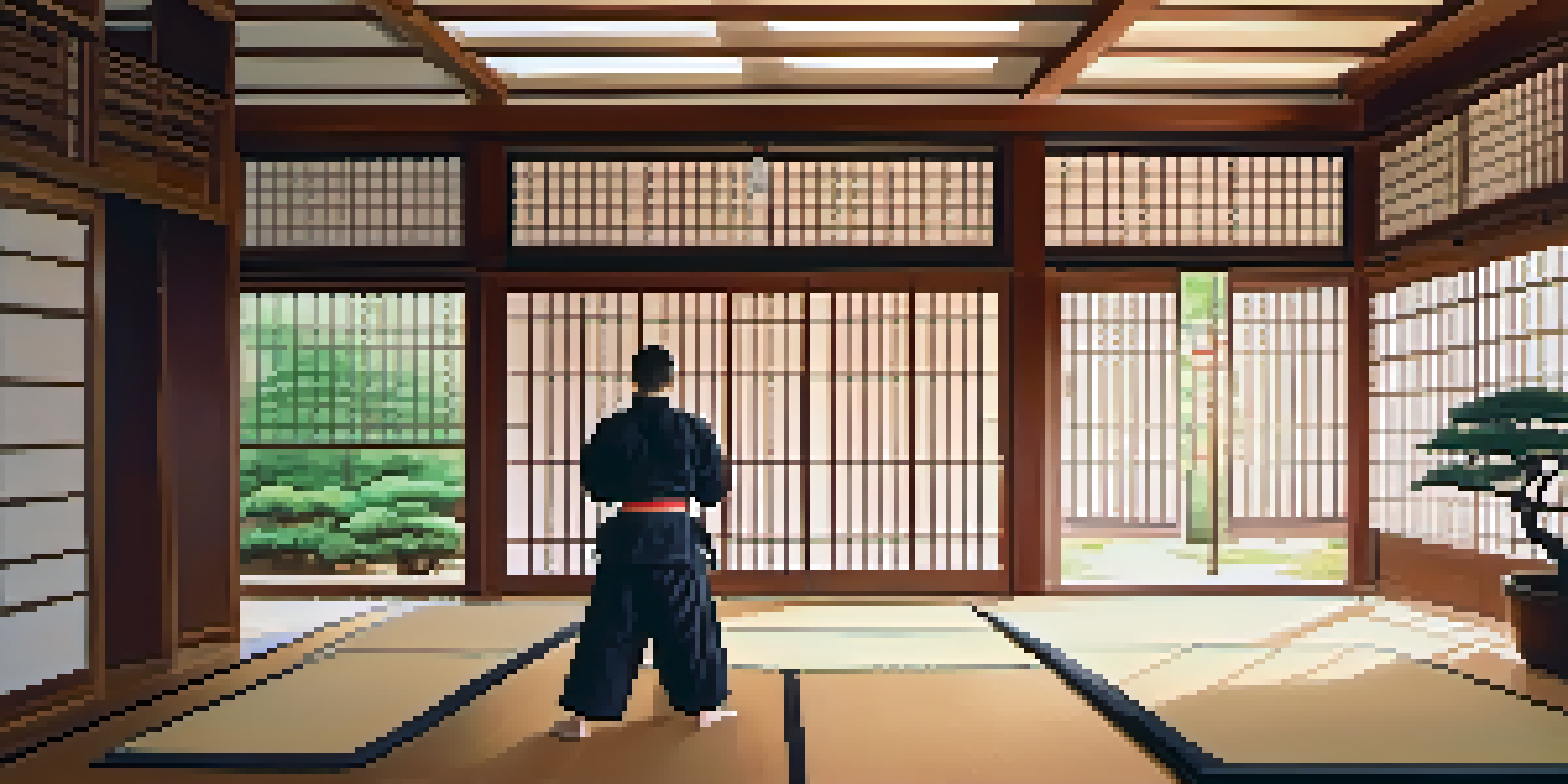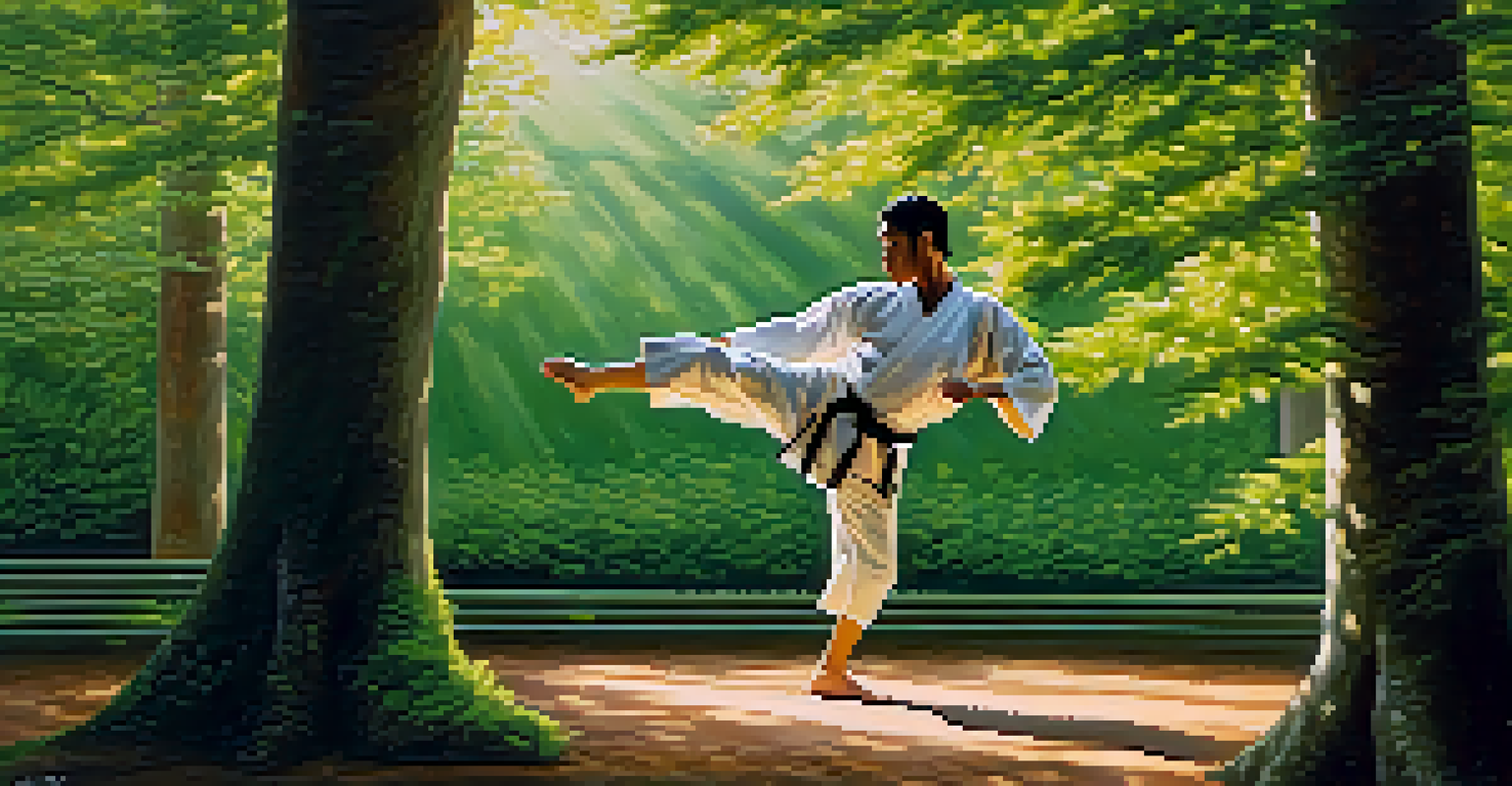Mindfulness in Martial Arts: A Tool for Conflict Management

Understanding Mindfulness: The Core Concept
Mindfulness is the practice of being fully present and engaged in the moment. It encourages awareness of our thoughts, feelings, and bodily sensations without judgment. Essentially, it's about tuning into ourselves and our surroundings, which can be especially beneficial in high-stress situations like martial arts.
Mindfulness isn't difficult, we just need to remember to do it.
In martial arts, this heightened awareness can lead to better decision-making and more effective responses during conflicts. Practitioners learn to observe their thoughts and emotions, which helps them manage reactions that might escalate a situation. This practice not only enhances performance in training but also carries over into daily life.
By incorporating mindfulness into martial arts, individuals cultivate a sense of calm and clarity. This inner peace is essential when facing conflicts, allowing practitioners to respond thoughtfully rather than react impulsively. It’s a powerful tool for both self-defense and personal growth.
The Role of Breathing Techniques
Breathing techniques are a fundamental aspect of mindfulness and play a crucial role in martial arts. Focusing on breath helps practitioners ground themselves, especially in moments of stress or confrontation. By controlling their breath, martial artists can maintain composure and clarity, which are vital for effective conflict management.

For instance, a simple deep breathing exercise can reduce anxiety before a match or when facing an aggressive opponent. Breathing deeply not only calms the mind but also helps to regulate the body's physiological responses to stress. This allows martial artists to think more clearly and act more decisively.
Mindfulness Enhances Conflict Management
Practicing mindfulness in martial arts helps individuals respond thoughtfully to conflicts rather than react impulsively.
Moreover, these techniques are transferable to everyday conflicts. Whether it’s a heated discussion at work or a disagreement with a friend, taking a moment to breathe can shift one’s perspective. This pause can create space for thoughtful responses rather than knee-jerk reactions, leading to more constructive outcomes.
Cultivating Emotional Awareness Through Practice
Emotional awareness is another key benefit of mindfulness in martial arts. As practitioners train, they become more attuned to their feelings and how those emotions influence their actions. This self-awareness is critical when navigating conflicts, as it helps individuals recognize triggers and respond appropriately.
The mind is everything. What you think you become.
For example, a martial artist might notice feelings of frustration arising during practice. Instead of allowing those emotions to dictate their actions, they can acknowledge them and choose a more constructive response. This skill not only improves performance but also enhances interpersonal relationships outside of the dojo.
By developing emotional awareness, martial artists can engage in conflicts with a clearer mindset. They learn to separate their feelings from their actions, which fosters empathy and understanding. This approach transforms potential conflicts into opportunities for dialogue and resolution.
Mindfulness Techniques for Conflict Resolution
Martial arts offer several mindfulness techniques that can be applied to conflict resolution. Visualization, for instance, is a powerful tool where practitioners imagine themselves successfully navigating a challenging situation. This mental rehearsal can boost confidence and prepare them for real-life encounters.
Another technique is active listening, which involves fully concentrating on what others are saying without formulating a response while they speak. This practice helps to build rapport and understanding, making it easier to resolve conflicts amicably. In martial arts, listening is just as important as physical techniques.
Breathing Techniques Foster Calmness
Controlled breathing techniques allow martial artists to maintain composure during stressful situations, benefiting both performance and daily life.
Incorporating these techniques into daily life can transform how individuals approach disagreements. By being mindful and present during conflicts, they can foster open communication and reach resolutions that are beneficial for all parties involved. This proactive approach can significantly reduce the likelihood of escalation.
The Impact of Mindfulness on Physical Performance
Mindfulness in martial arts doesn’t just enhance mental clarity; it also improves physical performance. By being present in the moment, practitioners can execute techniques more effectively, resulting in better overall outcomes. This focus allows for a deeper connection with their body, leading to improved agility and coordination.
For instance, when a martial artist practices mindfulness, they may notice subtle cues in their movements that they would otherwise overlook. This awareness can lead to more precise techniques and better timing during sparring sessions. As a result, practitioners not only become more skilled fighters but also more adept at handling conflicts.
Moreover, this improved physical performance can boost confidence, which translates to more effective conflict management. When individuals feel physically capable, they are more likely to approach conflicts with a calm and confident demeanor. This shift can significantly change the dynamics of any confrontation.
Building Resilience Through Mindfulness Practices
Resilience is an essential quality for managing conflicts, and mindfulness practices in martial arts can help cultivate it. Through regular training, practitioners learn to face challenges and setbacks in a controlled environment, which builds their ability to cope with stress. This resilience is crucial when dealing with conflicts in everyday life.
For example, a martial artist who experiences a failure during practice learns to view it as a learning opportunity rather than a setback. This mindset shift fosters resilience and encourages a proactive approach to conflict resolution. They become adept at bouncing back and finding constructive solutions.
Emotional Awareness Builds Resilience
Developing emotional awareness through mindfulness empowers martial artists to navigate conflicts with empathy and a clearer mindset.
By incorporating mindfulness into their practice, martial artists not only improve their physical skills but also develop a resilient mindset. This ability to withstand and recover from difficulties empowers them to handle conflicts with grace and confidence, ultimately leading to more peaceful interactions.
Integrating Mindfulness into Everyday Life
Integrating mindfulness learned from martial arts into daily life can be transformative. Simple practices, such as setting aside a few moments each day for meditation or mindful breathing, can create a sense of calm and clarity. This practice prepares individuals to face conflicts with a balanced mindset.
Moreover, being mindful in everyday interactions enhances communication and understanding. When individuals approach conflicts with awareness and empathy, they are more likely to find common ground and resolve issues amicably. This shift in perspective can lead to healthier relationships both personally and professionally.

Ultimately, the skills learned in martial arts extend far beyond the dojo. By making mindfulness a part of daily life, individuals can navigate conflicts more effectively, fostering a more peaceful and harmonious existence. This integration can yield profound benefits, both on and off the mat.